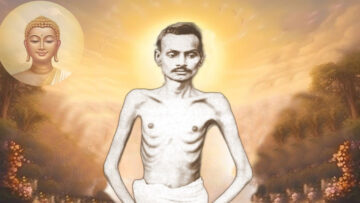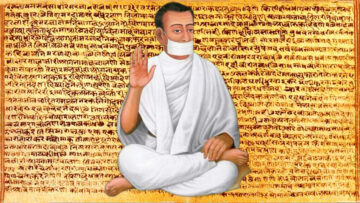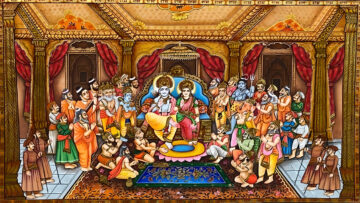India, that is Bharat, is one of the two oldest surviving civilizations of the world, along with China. A linked chain of thoughts joins the ancient Vedantic wisdom to the philosophy of modern Indian nationalism. This continuity since millennia is what differentiates India from other modern nation-states. However, Western scholars have usually found it difficult to explain what unites India. They attribute this unity either to the British legacy or to the modern state institutions. Herein lies the importance of the wisdom of Aurobindo Ghose, who explained Indian unity and nationalism through a Dharmic framework. His works also illuminate the inclusive and federal character of Indian nationalism, which is in sharp contrast to the Western European concepts of nationalism that are exclusive due to their ethnic character.
Aurobindo Ghose (1872-1950), the prophet of Indian nationalism, is one of the most pioneering civilizational figures in the history of modern India. His ideas impacted the formulation of Indian nationalism during the early stages of the independence struggle fundamentally. He gave a decisive edge to the national movement along with Bal Gangadhar Tilak and Bipin Chandra Pal. He was the first to put forth the demand of ‘Purna Swaraj‘, which was officially adopted by the leadership of the Indian National Congress in 1929 at the Lahore session.
After his acquittal in the Alipore Bomb Case in 1909, Aurobindo delivered his famous Uttarpara Speech. This speech marks the transition of Aurobindo’s journey from political to a spiritual one. This essay tries to explore the context of his speech and also underlines how the values and principles elaborated in it by Aurobindo remain immortal and are of continued significance to not only Bharat but the entire humanity at large in the face of the current challenges of climate change, terrorism, sectarianism, and social injustices.
When Aurobindo was acquitted and released from jail, the Swadeshi Movement and the related revolutionary activities had lost momentum. The cries of ‘Bande Mataram’ had gone silent, and there seemed to be a tremendous amount of pessimism and hopelessness in the general masses. Aurobindo looked upon this environment of silence as a signal that Indians have lost their way forward for liberating the soul of Bharat from the clutches of Western imperialism.
The organizers of the meeting had asked Aurobindo to speak on the subject of the Hindu religion. However, he said that spiritual wisdom that was revealed to him by the Almighty in jail he would share with the audience present and the nation at large. He accepted that he himself was clueless about the future roadmap of the national movement, but he believed that it was the decision of Ishwar to bring it to a temporary lull.
Why was it so? It was so because Ishwar wanted the people of Bharat to look within themselves and reflect upon their actions to understand the will of Ishwar. Aurobindo’s spiritual realization during the jail term exposed him to this message of Ishwar, and he was commanded to take this message forward. He said that he wanted to use this occasion to fuel the fire of independence in the heart of every nationalist residing in every nook and corner of the country. He reiterated that there was no power on earth that could stop Ishwar’s instrument and what he had been decided for this great nation of ours.
However, his arrest in the bombing case shook his faith in Ishwar and led him to question God as to why he met this fate even though he was only fighting for the self-determination rights of the Indians against the might of a colonial state, Why, for doing something righteous, was he denied the protection of the Almighty? It was when he started questioning the motives of Ishwar; the first lesson came to him, which was the doctrine of ‘Nishkaam Karma’ which Sri Krishna demanded of Arjuna. Aurobindo says:
“…… He demands of those who aspire to do His work, to be free from repulsion and desire, to do work for Him without the demand for fruit, to renounce self-will and become a passive and faithful instrument in His hands, to have an equal heart for high and low, friend and opponent, success and failure, yet not to do His work negligently.”
The doctrine of Nishkaam Karma guides a seeker to be absolutely involved in the process of achieving his goal. It is not the end that matters but the means; it is not about the destination but the journey. An analogy to understand this can be the process of germination of a seed. When soil, water, aeration, etc., are taken care of (means/process) as per the requirement, the germination of the seed (end/goal) is a logical outcome.
So what was Aurobindo trying to tell the nation through this? He was asking the people who were staring at despondency to not to stop doing the action. Swadeshi Movement was not the endpoint of the struggle; rather the struggle needs to be carried out with continued zeal. The struggle for Purna Swaraj requires complete devotion to the cause without worrying about the consequence. Only when we fail to achieve a goal to which our expectations are attached does despondency catch us. When there is no attachment or expectation of the goal but only complete immersion in the process, the process itself becomes an achievement. This sense of devotion keeps pushing us towards the goal in an organic way.
Aurobindo then goes on to explain the more profound meaning and nature of Sanatan Dharma. Here, Sanatan Dharma should not be seen in a reductionist way i.e., as signifying a way of worshipping or as a way of faith and profession, but rather should be seen as a way of life. ‘It is life itself; it is something that has not much to be believed as lived’. Dharma is a Sanskrit non-translatable word that has no equivalent in the English language. Approximately it can be understood as denoting ‘righteous duty’. Dharma sustains life and order. Dharma exists at every level i.e., at an individual level, societal level, and cosmic level.
It is this message of Sanatan Dharma that has to be delivered by India to the world. This is the reason why India shall rise, and India will rise. India’s role is not limited only to its own self-interests or its own geography, but rather, India exists for humanity, which is why India needs to be great. Aurobindo seemingly takes a dig at the paradoxical modern Western nation-states that try to crush the spirits of the colonized nations despite talking about the high morals of liberty and equality. Rabindranath Tagore further developed this argument in his writings on nationalism. Tagore criticized Western nationalism for being exclusivist and imperialist. This frustration with the West was expressed aptly in his pamphlet called ‘Crisis in Civilization’ after witnessing the wide-scale destruction in World War II.
Aurobindo then proceeds to elaborate on what he considers as the central truth of Sanatan Dharma. It is the existence of Ishwar in each and every living entity – be it humans, or trees, or animals that points out to the recognition of the fundamental equality of every living being on the planet. It is in sharp contrast to the non-Indic philosophies where humans are taken as the center of the earth, having supremacy and right over other beings. In the philosophy of Sanatan Dharma, it is recognized that humans have a more evolved consciousness where they can overcome their passions and desires to seek the ultimate truth. However, this recognition does not grant humans a right over other beings; rather it makes them even more duty-bound to preserve and conserve the life and dignity of other beings. The presence of ‘Brahm’ in every living being establishes the equality of all inherently.
Aurobindo says that Ishwar has given an additional responsibility to those who are adequately capable in material and spiritual terms towards those who are at the margins. Those who carry out righteous actions to fulfill this responsibility, Ishwar keeps a protective eye on them and prevents them from being fearful. Aurobindo also experienced this during his jail term, where he was initially fearful but very soon was liberated from this emotion. He was directed by ‘Vasudeva’ to obliterate the sufferings of the weak and to walk tall – never to fear, never to hesitate. It is by fulfilling this dharma that Aurobindo thought he was helped by Vasudeva himself through a human agency to be acquitted and come out of jail.
Citing his own example, Aurobindo cautions all the Karmayogis not to fall into the trap of ‘Ahm pravritti’ i.e. human ego. While fulfilling all the responsibilities given by Ishwar to the individuals, they must not let their ego build-up. When bestowed with immense responsibilities, an individual may have an inclination to think that he has become the doer of everything, but it must be remembered at all times that achieving a goal will not stop even if the individual stops fulfilling his own dharma. The others will carry the baton of dharma forward and fire up the rise of Bharat. The rise of Bharat is inevitable because the cosmic spirit has destined it to. Hence, it is imperative on part of the individuals to see themselves as tiny sparks in this process and realize their true potential as Karmayogis, as many such tiny sparks will together light up the Indic sky bringing imminent glory to this great land of Bharat.
Aurobindo then explains his association with Yoga and subsequent realization of the two messages that will guide the spiritual awakening of the Indian nation. First was that it is the duty of every person to help in the upliftment of this great nation. Second was the duty of the individuals as well as the independent nation-state to deliver the eternal message of Sanatan Dharma to the world. Without Sanatan Dharma, there is no India, and without India, the message of Sanatan Dharma would not reach every corner of the world. He says:
“… It is for the Sanatan Dharma that they (Indians) arise, it is for the world and not for themselves that they arise. When therefore it is said that India shall rise, it is the Sanatan Dharma that shall be great. When it is said that India shall expand and extend herself, it is the Sanatan Dharma that shall expand and extend itself over the world. It is for the dharma and by the Dharma that India exists.”
Here we see the contradiction in the Western and the Indian notion of expansionism. While the West uses territorial power and other materialistic ways to expand its influence, the Dharmic principle of expansion is about influencing the hearts and minds of people. Chinese scholar Hu Shih famously said that India conquered and dominated China culturally for 2000 years without sending a single soldier across.
Aurobindo then elaborates on Hindu religion, where he liberates its definition from the narrow confines of religion in the West. Hindu religion grew in the sacred geography between the mighty Himalayas and the vast Indian Ocean. However, it is an eternal religion, and its spirit is universal that embraces all others. It is about the cosmopolitan spirit of वसुधैव कुटुम्बकम् – ‘Vasudhaiva Kutumbakam’. This inclusive character makes it stand apart as a religion. A sectarian and an exclusivist religion can live only for a limited time, serving a limited purpose. The overarching philosophy of Sanatan Dharma has been able to balance the knowledge of the material world, which the Bhagavad Gita calls ‘avidya’, and the spiritual knowledge called ‘vidya‘. It insists on the realization of the truth but acknowledges that there are multiple ways to know it, i.e. the doctrine of एकं सद्विप्रा बहुधा वदन्ति – ‘Ekam Sat Vipra Bahudha Vadanti’.
Aurobindo then creates a synthesis between the values of Sanatan Dharma and the notion of Indian nationalism. There is no conflict between these two; rather they are complementary and synonymous with each other.
“I say no longer that nationalism is a creed, a religion, a faith; I say that it is the Sanatan Dharma which for us is nationalism…When the Sanatan Dharma declines, then the nation declines, and if the Sanatan Dharma were capable of perishing, with the Sanatan Dharma it would perish. The Sanatan Dharma, that is nationalism. This is the message that I have to speak to you.”
The significance of the Uttarpara Speech lies in the fact that it reminds Indians about the larger role that India has to play in the world. It unveils the idea of deep rooted nationalism where the nation’s people remain firmly attached to the ancient Indian values while navigating the choppy waters of the current world order. India’s quest for Purna Swaraj should be not be looked as an end; rather it is a means to make India capable of telling its story in the global arena and deliver its unique spiritual message to humanity.
So, if one were to think about the most important speeches in the history of modern India, Uttarpara Speech (1909) is bound to be one of them along with the Chicago address of Swami Vivekananda (1893), Nehru’s Tryst with Destiny (1947), and Ambedkar’s last address to the Constituent Assembly (1949).
The Uttarpara Speech remains one of the most influential guiding lights for modern India, which has a unique civilizational heritage to guide humanity in fighting the challenges of today and of the centuries to come.
Image credit: sriaurobindoashram.org
Disclaimer: The opinions expressed in this article belong to the author. Indic Today is neither responsible nor liable for the accuracy, completeness, suitability, or validity of any information in the article.







